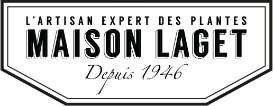Quality Charter
Identification & Origin
All of our vegetable oils come from organic farming, are exclusively of vegetal origin and obtained using traditional mechanical processes without any sort of chemical treatment to give you the highest guarantee of quality and to preserve the wealth in bioactive elements, nutrients, vitamins and essential fatty acids.
MAISON LAGET is compliant with ECOCERT France standards thereby demonstrating its commitment to respect the organic production methods and processes, both in terms of cosmetic products and food quality products.
How vegetable oils are extracted
Our vegetable oils are all virgin oils obtained by cold pressing.
In Europe, the term virgin vegetable oil is a strictly defined and protected legal term which defines vegetable oils obtained exclusively by a mechanical process, with no refining operations of any type. Their acidity levels, expressed by the quantity of oleic acid, must not exceed 2 grams per 100 grams (2%).
Refined oils or oils whose acidity is higher than 2% do not benefit from this designation.
Only virgin vegetable oils obtained by first cold-pressing give you the guarantee that the oil has not been heated or refined and has not undergone any chemical treatment. This mechanical process preserves their qualities and the subtleties of their composition: they are rich in nutritional elements, essential fatty acids (AGE) *, vitamins (vitamin E * in particular) and other substances essential to the elasticity and firmness of the skin tissues.
For further details on how cold-pressed virgin oils are extracted, please see below under ‘Extraction’.
All of our vegetable oils of beauty are guaranteed 100% organic, natural and pure. They contain no preservatives, artificial colours or synthetic fragrances, are GMO free and comply with ECOCERT Greenlife Ecological and Biological Cosmetic standards.
Traceability and Best Before Dates
We rigorously and systematically check each batch entering our workshop so as to accurately list the origins and characteristics of plant and packaging materials (bottles, caps...).
This 360 degree traceability is referenced by a batch number assigned to each product allowing the complete and perfect identification of each component of the product. With this batch number, we are able to trace each component back to our different suppliers, who in turn can do the same throughout their own manufacturing circuits.
On each product, a Best Before Date informs you of the optimum and recommended lifespan of each product.
Our packaging is environmentally friendly, recyclable and minimal.
Extraction
There are various methods used to extract a vegetable oil for culinary or cosmetic uses.
- Authentic mechanical cold-pressing to crush the seed or the fruit pericarp and extract its oil (first cold-pressing).
- Heated oil extraction which increases the amount of oil produced but degrades the quality. Oil created through heating process sometimes loses its colour as must usually be refined.
- Chemical extraction using a solvent (hexane, ketone, butane, gasoline B, ethanol ...) performed on the vegetable matter remaining after the first press and followed by refining. This technique is widely used for obtaining the oils you commonly use every day in the kitchen…
All of our cold-pressed virgin oils are obtained directly from organic seeds or oleaginous fruits by traditional mechanical extraction processes exclusively. They undergo no chemical treatment or refining whatsoever!
Steps in the first cold-pressing process:
- Cleaning:
The seeds are sorted and cleaned to remove impurities (dust, pebbles...).
- Lamination:
Seeds with an enveloping shell (sunflower) are shelled in a flattener. A suction process separates the seeds from the shell husks.
- Extraction by first cold-pressing:
The seeds are mechanically crushed in a slowly rotating screw press designed to operate at low temperatures and avoid any heating of the seeds and the oil is extracted. The resulting oil is a first cold-pressed virgin oil.
- Filtration:
The oil that flows naturally from the screw press will be filtered several times, initially through a cotton canvas or stainless steel grid and then through blotting paper.
What is not well-know to the general public is that when oils are heated or extracted with the use of solvents they must further be refined by a series of more or less harmful chemical treatments which cause them to lose their nutritive bioactive properties and cosmetic qualities.
Refining involves several steps:
- De-gumming:
Mucilages are impurities present in oils that were heat-extracted using solvents that are then removed by adding sulphuric or phosphoric acid to the oil which is then centrifuged.
- Neutralization:
Refined vegetable oils have a high level of free fatty acids (FFA’s) which can accelerate their oxidation and ageing process. Neutralization is performed by adding caustic soda to the oil and then passing the mixture obtained through a centrifuge before washing and vacuum drying the final extract.
- Discolouration:
Heated and solvent extracted oils need to be bleached with bleaching earth powders (to which phosphoric and sulphuric acids and activated charcoal are added) or chemical bleaching agents before they are filtered.
Deodorization:
To eliminate the unpleasant odour of refined oils, they are then heated to high temperatures (180-200 ° C). The vacuum diffusion of water vapour captures the offending olfactory molecules. This process does not involve any chemical ingredients and is compatible with organic standards.
Re-colouration:
The refined vegetable oil is recoloured with products such as curcumin, carotenoid, etc. ... to restore an appealing colour.
In light of the above….be wary and always carefully read the indications on the label!
You should therefore avoid ‘cold-pressed’ oils, which are systematically refined, unlike ‘cold-pressed virgin oils’ which have definitely not been.
In the same way you should be aware that a ‘virgin oil’ was subjected to higher temperatures than ‘first cold-pressed virgin oils’ and that due to the heat extraction process it will have lost a large part if not most of its properties...
Uses & Conservation:
Naturally sweet, non-abrasive, they contain no artificial scents and are packed with all the active ingredients and subtle scents of the plants, seeds or fruits from which they are derived.
Our vegetable oils all have protective, soothing, nourishing and regenerative properties. They are a wonderful elixir of beauty and care for your face, body, nails or hair:
Vegetable oils are generally applied topically as a care cream, preferably in the evening for a deeper prolonged action, though they can be applied at any time and as often as you want over longer time-frames.
Vegetable oils are highly recommended for hair care: fully applied at night before shampooing, or on the hair tips afterwards.
Vegetable oils work to strengthen the nails. They soften the cuticles (skin surrounding the nail) and in the process will also nourish irritated, dry or chapped hands irritated.
White lily oil is particularly worthy of note in that it is known to reduce and even eliminate brown spots associated with the premature ageing of the epidermis.
All of our vegetable oils are certified and sold as organic cosmetics. You can use them as often as you wish for the care of your face, body, nails and hair; they can be used for massages and to dilute essential oils.
Vegetable oils are recommended as carrier oils for essential oils
Some essential oils can be highly dermocaustic. To avoid any risk of irritation and even burns, these essential oils must be diluted in a vegetable oil before they are applied on the skin. Sweet almond oil is neutral and is recommended as the go-to carrier oil, but any vegetable oil can be used. In many cases, the vegetable oil that you choose as a carrier oil will have properties of its own that complement and even reinforce the action of the essential oil; a great example is Everlasting Helichrysum macerate which is added to essential oils when treating circulatory disorders.
So ... which essential oils require dilution?
Dermocaustic – slightly or not at all:
Bergamot - Rosewood - Cade Juniper- Noble Chamomile - Caraway - Gum Rockrose - Cypress - Eucalyptus globulus - Eucalyptus radiata - Sweet Wintergreen (or Wintergreen) - Juniper - Rose Geranium - Helichrysum – Aspic Lavender - Lavender – Hybrid Lavender - Lemongrass –Peppermint - Myrtle - Palmarosa - Ravintsara - Camphor, cineole or verbenone Rosemary - Saro (or Mandravasarotra) - Tea tree - Ylang-Ylang.
Dermocaustic – possibly:
Dill - Exotic Basil - Lemon - Lemongrass - Tarragon - Ginger - Green Mandarin - Sweet Orange - Marjoram - Niaouli - Siberian Pine - Sandalwood - Thyme linalool or thujanol.
Dilute up to 20% in a carrier oil.
Dermocaustic – highly:
Cinnamon - Clove - Oregano - Savoury - Thyme thymol.
Dilute between 5% minimum and up to 20% in a carrier oil.
* Disclaimer: the information available here and in our general documentation does not claim to be exhaustive and is made available for information purposes only. In no case does it replace the medical advice necessary in the establishment of a diagnosis and in assessing the severity of a pathology. This information drawn from research conducted by healthcare professionals is the synthesis of our research on aromatherapy and includes reference books by Pierre Franchomme and Dr. Daniel Pénoël: "Precisely Aromatherapy" Roger Jollois Editor, of Aromatherapist pharmacist Dominique Baudoux: "Aromatherapy, healing with essential oils" (Editions Amyris), Dr. Zhiri and Dominique Baudoux: "Scientific aromatherapy - chemotyped essential oils and their synergies" (Editions Inspir), Dr. Jean Valnet: “The Aromatherapy Pocket Book”, Danielle Festy, pharmacist:" My Bible of essential oils ", Fabienne Millet, pharmacist: "The great guide to essential oils", (Marabout.) This content is not intended to be a substitute for professional medical advice, diagnosis, or treatment, and does not constitute medical or other professional advice. Maison Laget shall not be liable for any direct, indirect, consequential, special, exemplary, or other damages arising therefrom.
Conservation
Our vegetable oils are 100% pure and natural and are guaranteed to be without artificial colouring or preservatives. They are fragile and extremely sensitive to light, air and heat – keep them in a dark, cool place away from the light.
A best-before date found on the bottle indicates the optimal product storage and lifespan.
If, despite all precautions, you notice that your oil has a rancid scent it means that the fatty acids contained within have oxidized. You should replace your oil and avoid application as it may be harmful to your skin.




